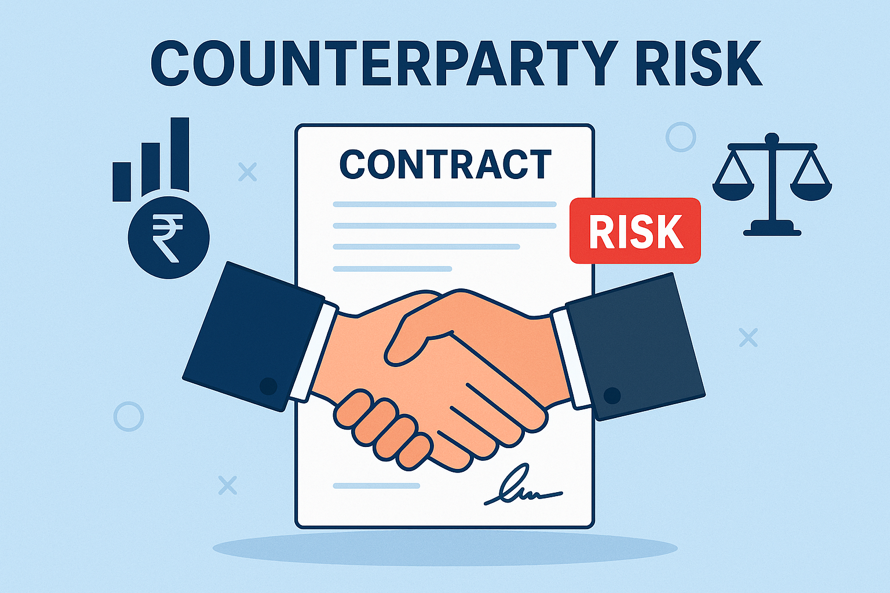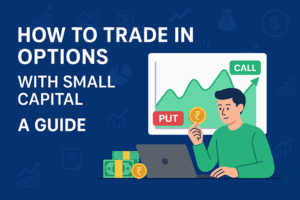Understanding Counterparty Risk: Why It Matters for Investors

Introduction: What Is a Counterparty?
When you buy stocks, take a loan, or even order food online, there’s someone on the other side of the deal. That person or company is your counterparty. A counterparty is simply the other party in a contract or transaction. Without counterparties, there are no deals, no trades, and no markets.
But here’s the catch: if your counterparty can’t or won’t keep their end of the bargain, you face a risk—counterparty risk.
Why Should You Care About Counterparty Risk?
Let’s say you buy shares through a brokerage. If the broker goes bankrupt, you might lose your money. That’s counterparty risk in action.
Counterparty risk affects more than just big banks or hedge funds. It’s part of every transaction—whether you’re a retail investor in India or a giant global fund. If too many counterparties fail, it can shake the whole financial system, just like what happened in the 2008 crisis.
Examples of Counterparty Risk
Here are some simple examples to make it clearer:
| Scenario | Who’s the Counterparty? | Risk for You |
|---|---|---|
| Buying stocks through a broker | Your broker | Broker might collapse, holding your funds |
| Taking a loan from a bank | The bank | Bank might default, delaying your funds |
| Trading derivatives (futures, options) | The other trader or the clearing house | They might not settle the trade if markets crash |
| Ordering online | The seller/delivery app | They might cancel or delay your order |
How to Manage Counterparty Risk
Do Your Homework
Before investing, check your counterparty’s reputation, credit rating, and financial health. For instance, choose a well-known broker instead of a small, unknown firm.
Diversify
Don’t put all your money in one place. Spread it across different brokers, banks, and investments.
Use Collateral and Margin
Big investors and traders often use collateral (like cash or stocks) to secure deals. This ensures there’s backup if something goes wrong.
Understand Clearing Houses
Clearing houses, like NSE Clearing Ltd. in India, act as middlemen. They step in if a buyer or seller defaults. This reduces risk for traders in futures and options markets.
Know the Rules
Regulations like Basel III (for banks), Dodd-Frank Act (US), and EMIR (Europe) exist to protect investors. In India, the SEBI ensures brokers follow risk management rules.
Why It Matters to Indian Investors
Indian investors face counterparty risks too. For example:
- If your broker mishandles funds, SEBI rules help protect you.
- If you trade derivatives, NSE Clearing helps manage risks.
- If your bank collapses, RBI’s deposit insurance may limit your losses (up to ₹5 lakh).
But these protections have limits. That’s why you should stay informed and manage your risks smartly.
FAQs
Q1. What is counterparty risk in simple terms?
It’s the risk that the other party in a deal can’t or won’t keep their promise.
Q2. Can retail investors face counterparty risk?
Yes, for example, when you trade stocks through a broker or buy insurance.
Q3. How do clearing houses reduce counterparty risk?
They guarantee trades. If one party fails, the clearing house steps in to settle the deal.
Q4. What should I check before choosing a broker?
Check SEBI registration, financial strength, reputation, and customer reviews.
Q5. Are all counterparties risky?
Yes, but risk levels vary. Large banks have strict rules; smaller firms may carry higher risk.
Disclaimer
The stocks mentioned in this article are not recommendations. Please conduct your own research and due diligence before investing. Investment in securities market are subject to market risks, read all the related documents carefully before investing. Please read the Risk Disclosure documents carefully before investing in Equity Shares, Derivatives, Mutual fund, and/or other instruments traded on the Stock Exchanges. As investments are subject to market risks and price fluctuation risk, there is no assurance or guarantee that the investment objectives shall be achieved. Lemonn (Formerly known as NU Investors Technologies Pvt. Ltd) do not guarantee any assured returns on any investments. Past performance of securities/instruments is not indicative of their future performance.







